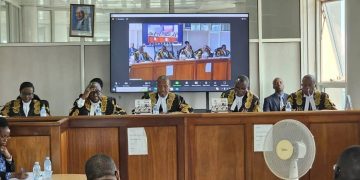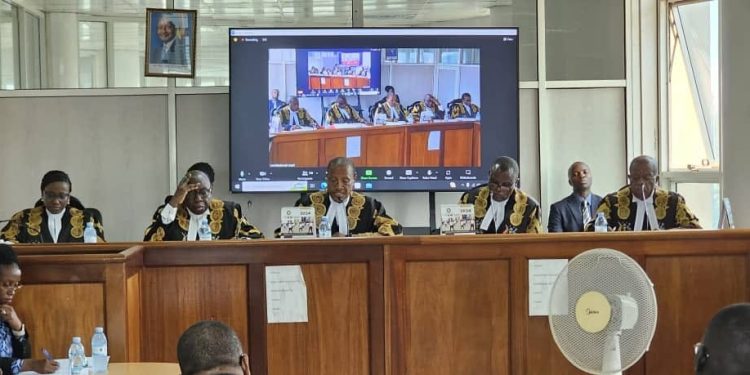The Constitutional Court has declined to nullify the Anti-Homosexuality Act 2023 in its entirety.
The Deputy Chief Justice, Richard Buteera, leading the five-member court, said Wednesday that the court reached a unanimous decision.
After President Museveni signed the controversial Anti-Homosexuality Bill, 2023 into law, 11 activists petitioned the Constitutional Court seeking to block its implementation.
The petitioners who include former Makerere University lecturer of law Prof Sylvia Tamale, journalist and businessman Andrew Mwenda, Makerere University senior lecturer of law Dr Busingye Kabumba, Pan-African feminist activist Solome Nakaweesi and Budama North East MP Fox Odoi-Oywelowo, among others, asked the court to issue a permanent injunction against the implementation of the law.
Other petitioners included; Coordinator of Sexual Minorities Uganda (SMUG) Dr Frank Mugisha, former executive director of Freedom and Roam Uganda (FARUG) Jacqueline Nabagesera Kasha, Richard Smith Lusimbo, Eric Ndawula, William Apako and Human Rights Awareness and Promotion Forum (HRAPF).
They claimed that the conduct of the Speaker of the 11th Parliament (Anita Among) during the debate and passing of the Bill amounted to bias and is inconsistent with and in contravention of Articles 20, 89 (1) and (2) of the Constitution.
They, among others also claim that the law institutionalises a culture of hatred and creates a class of social misfits, which is inconsistent with and in contravention of Articles 2 (1) & (2), 20, 24 and 44 (a) of the Constitution, and is therefore null and void in its entirety.
On Wednesday morning, the Constitutional Court delivered its judgement on the petition challenging the Anti-Homosexuality Law, consequently declining to nullify the Anti-Homosexuality Act 2023.
“We decline to nullify the Anti-Homosexuality Act 2023 in its entirety neither would we grant a permanent injunction against its enforcement,” said Justice Buteera.
The court ruled that appropriate consultations were done before the passing of the Anti-Homosexuality law. The Court also held the Act didn’t have the effect of altering the previous court decisions.
The Justices ruled that the Anti-Homosexuality Act does not violate the right to practise business and profession. Section 112(b) of the Anti-Homosexuality Act aligns with Section 31 of the Uganda Communications Act and Section 13 of the Anti-Pornography Act, both of which are aimed at upholding societal morals by limiting the use of media to publish or broadcast offensive material, noted Justice Buteera.
“Evidence on record is (that) the Anti-Homosexuality Act was enacted against the backdrop of the recruitment of children into the practice of homosexuality. That is the mischief that Section 11 of the Act seeks to address.”
The court further ruled that the disqualification of homosexual convicts from employment in childcare institutions under Sections 12 and 13 of the Act is intended to protect children and vulnerable groups in society.
“We respectfully do not share the view that deriving pleasure from an action would negate its criminality; otherwise, offences like rape would be exempt from criminality.”
However, Sections 3(2)(c), 9, 11(2)(d) and 14 of the Anti-Homosexuality Act, 2023 have been nullified, which means that consensual homosexual acts between adults in privacy are not criminal.











